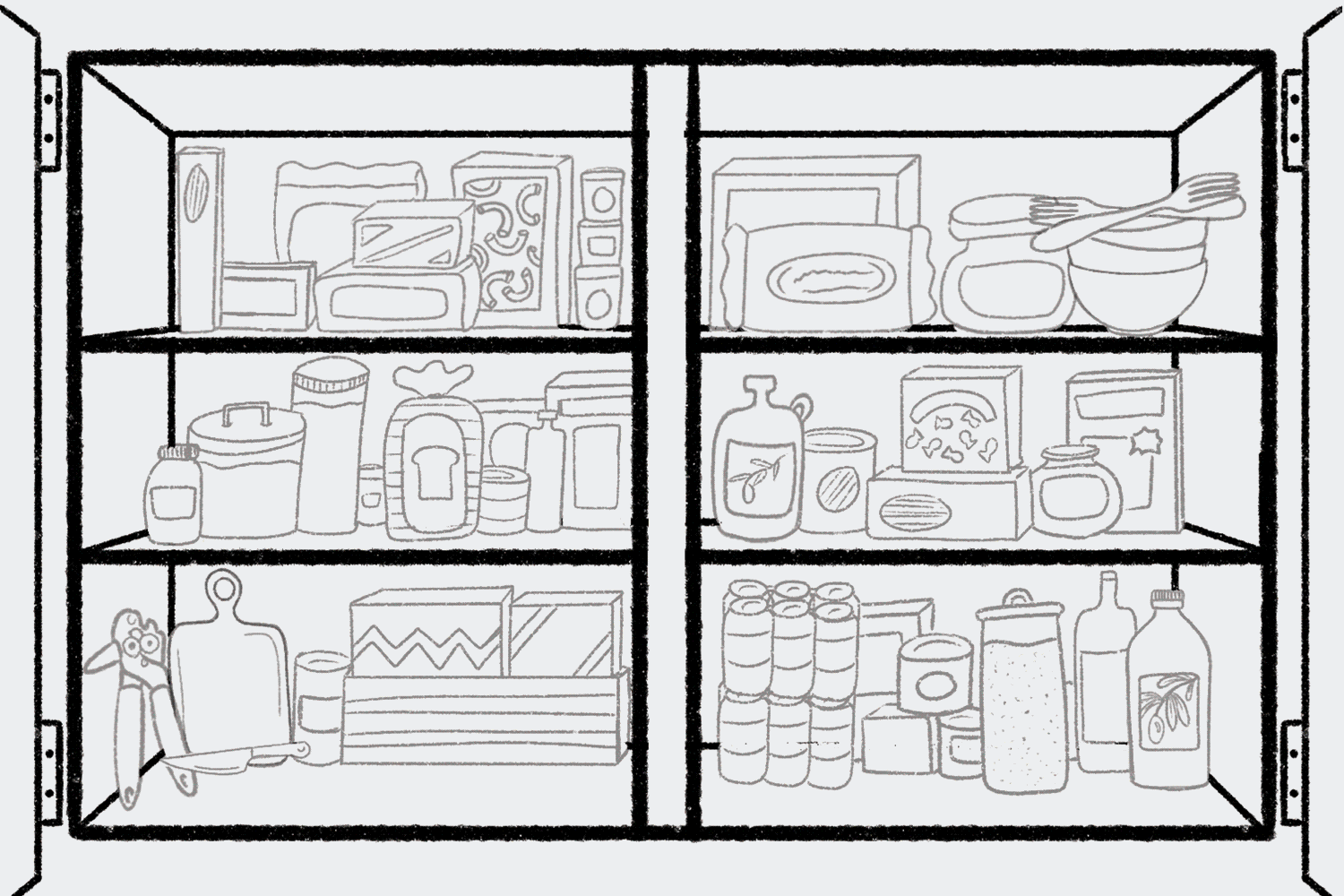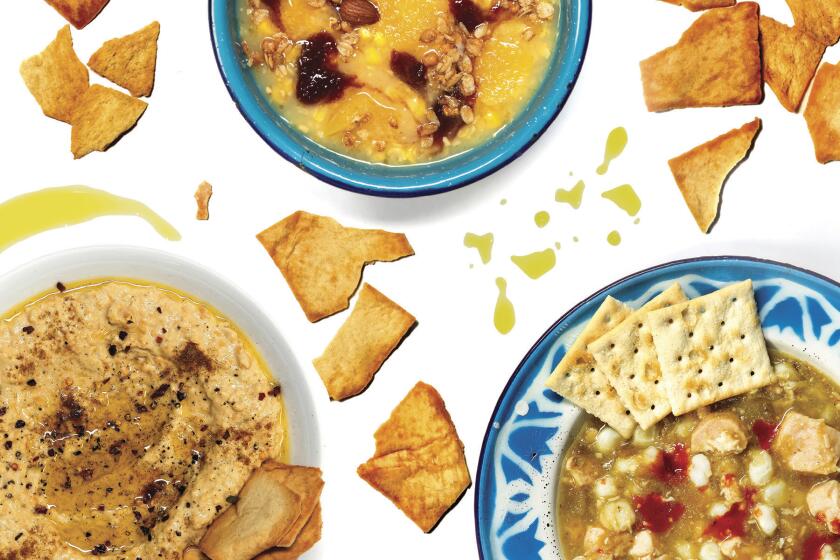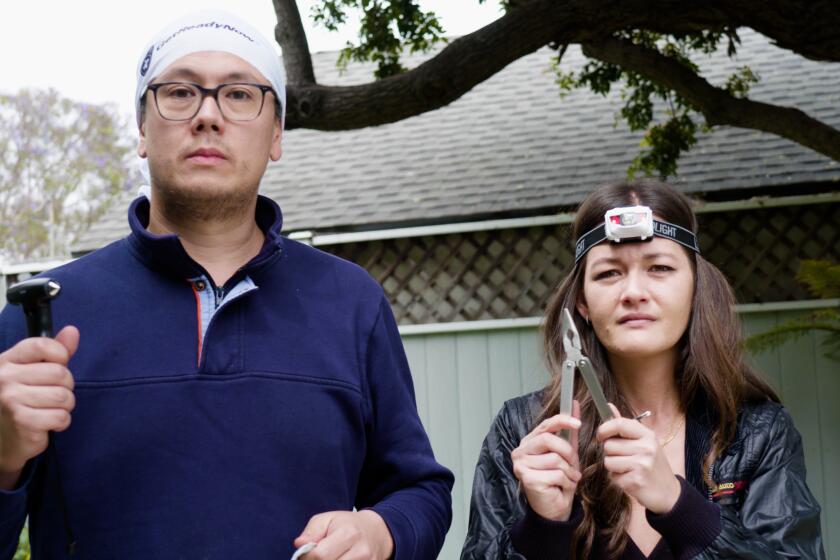Your earthquake kit isn’t complete without these foods and supplies

- Share via
If we’ve learned anything from zombie apocalypse movies over the years, it’s that the real threat to your life is running out of food. You need food so you have the energy to build a shelter or the mental clarity to run from the brain chompers. Or, in the case of an earthquake, the fortitude to sit without utilities and water for a few days.
So while it may seem a little silly to pack a kit full of foods that aim to keep you not merely alive but happy while eating, I think it goes a long way in the optimism department to trick yourself into feeling slightly better when forced to eat amid a disaster [insert crying-while-smiling emoji].
It’s with that assignment that I share with you what you should pack in your “cook’s kit.” These are items that fit all the guidelines for safe eating during an earthquake, and they include a few things that will help all that canned, cold food go down a little better.
First up, let’s talk about canned goods — which should be the largest part of your food supply because the food is already cooked and has moisture, which will be important when trying to conserve drinking water. Canned vegetables of all kinds are good here, but pick things you know you’ll eat — if you’ve never tried canned asparagus, now is not the time to experiment.
I can eat black beans, creamed corn, canned peaches and candied yams straight out of the can — cold — on any regular day of the week and be happy, so I know that’s what will be in mine. But instead of plain beans, maybe I’ll grab the ones with aromatics and spices added since I won’t be able to add my own fresh ones. There are also canned soups, of course, but for no logical reason, it seems extra depressing to me to eat those cold from the can rather than mix something up myself. Instead, grab baked beans, chili and refried beans — all staples available in a variety of flavors — to take the opportunity to indulge that part of you that was always curious about how they tasted.
And you can’t talk cans without mentioning Spam. Yes, if you like it, you should put it in your kit. I do not, however, so I’ll replace it with lots of canned fish and seafood like oil-packed tuna, sardines, mackerel and white anchovies. You want your canned protein to be somewhat fatty, which all these options are, so that you don’t run out of fuel. Stay away from crab or clams though — something about eating those at room temperature just doesn’t feel right, even in a natural-disaster scenario. But if you can snag some good smoked mussels, you won’t be sorry.
After canned goods, the next priority is dried foods because they’re shelf-stable and will keep in virtually any condition. I’m a jerky-head so I already have lots of different styles — venison with black pepper, salmon with brown sugar, bison with cranberry sauce — at the ready. I’ll also want to make sure I have lots of dried fruit on hand, especially dried dates, apricots, cranberries, raisins, prunes, mangoes and figs — the richer and chewier, the better.
And even though you may be thinking only about meals post-earthquake, as any hiker will tell you, you’ll still want snacks. Include your favorite crackers, granola and even some chocolate bars. A jar of nut butter may seem a luxury, but it’s probably the most energy-efficient food you can keep around. And the film of oil on top will keep it fresher than whole nuts, which, unless vacuum-packed, would go rancid in your kit quickly. Pair it with a jar of jam and you’ve got a carbless PB&J on your spoon whenever you need it. Or, you know, spread it on a rice cake.
Now, here’s where things get a little bougie. While these items might not be essential, if you have the means and the space in your kit, I recommend keeping them around to, again, keep your spirits up while you eat: a small bottle of olive oil, your favorite vinegar, some hot sauce, a squeeze bear of honey, soy sauce, a small bag of flaky sea salt or Tajín — even a spice blend like togarashi or dukkah. Drizzle a bit of oil and vinegar on those canned beans. Dip the dried date in Tajín. Dash some vinegar on that salmon jerky. Come day three or four of eating the same thing, trust me, you’ll be glad you have these things. (They’ll also be handy for creating any “recipes” from your provisions, like the ones here.)
Meals to make from canned food and a little seasoning ingenuity. These will make your earthquake emergency rations more palatable.
Lastly, give yourself permission to eat all the junk food you want. It’s not ideal, but also, you’re trying to survive a natural disaster so cut yourself some slack (now’s the time to stay alive, not worry about gaining weight). We’ve all had those days in airports when the only thing to eat for 24 hours was unsalted trail mix, dry cookies and sports drinks, so you know you can get through this.
Restock your kit every expiration date cycle with that “fun pack” of your favorite chips, a tray of Oreos or that box of Chicken in a Biskit crackers (real ones know) and for once in your life, eat the things that bring you pure joy. Once the lights and water come back on, you can pull yourself back together and experience the joys of eating a fresh vegetable again.
Don’t forget:
- A can opener (your new most valuable tool)
- A fork, spoon and bowl for each member of your household
- A knife and small cutting board (just in case)
- Instant coffee or tea, evaporated milk or dry milk and packets of sugar (you’ll still want caffeine, even in the end times)
- Crunchy things to dip into all that soft canned food, like crackers or pita chips
You can buy a plethora of earthquake kits online, but which ones are the best for the price? Here’s a look at four off-the-shelf options.
More to Read
Get earthquake-ready in six weeks
From building a kit to buying insurance, our Unshaken newsletter course will help you prepare.
You may occasionally receive promotional content from the Los Angeles Times.













